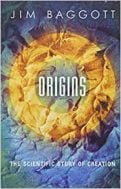OUP
ISBN: 9780198707646
This is a fasten-your-seat-belt ride all the way from the Planck Epoch to the dawning of consciousness, the consciousness that the world has come about through a cascade of physical phenomena.
In fascinating detail, covering quantum theory and geomorphology, Baggott provides a very readable account of the advent of mass, light, stars and mammals. In the case of mass, he observes, of quantum fields, that, “until very recently, these were inventions, needed to make the theories work… It’s important for us to understand the nature of these fields… because the Higgs field… is responsible for the origin of mass in the universe”.
This well-illustrated journey from the Big Bang to yesterday takes us through a range of fields, from particle physics and cosmology to chemistry and genetics. The text begins to totter when we reach the chapter on the coming of consciousness: “Unfortunately, the study of consciousness is the only discipline I’ve come across that is structured principally in terms of its problems. So we have the ‘hard problem’ of consciousness, the ‘mind-body’ problem… and many more”. This is a peculiar remark to make: that study is not a discipline, and draws on many fields, just as his account of stars and planets does. It is also regrettable, given the general clarity of his writing, that Baggott sporadically flops into cheery banter about pop culture and blurts out things like this: “But hey, let’s think positively. Unsolved problems are in many ways more fascinating”. They usually are.
The final chapter is disappointing, although trying to account for consciousness is hardly an easy task. Baggott has brought us all the way from specks to species, and it might have been better to leave it there, and hand over, with our gratitude, to another tour guide. While there is some discussion of sociality and language, there is no real consideration of perception and memory.
The book’s main virtue is its steady, principled presentation of the best available theories on how we got here, and it will grace any bookshelf.
Paul Taylor



